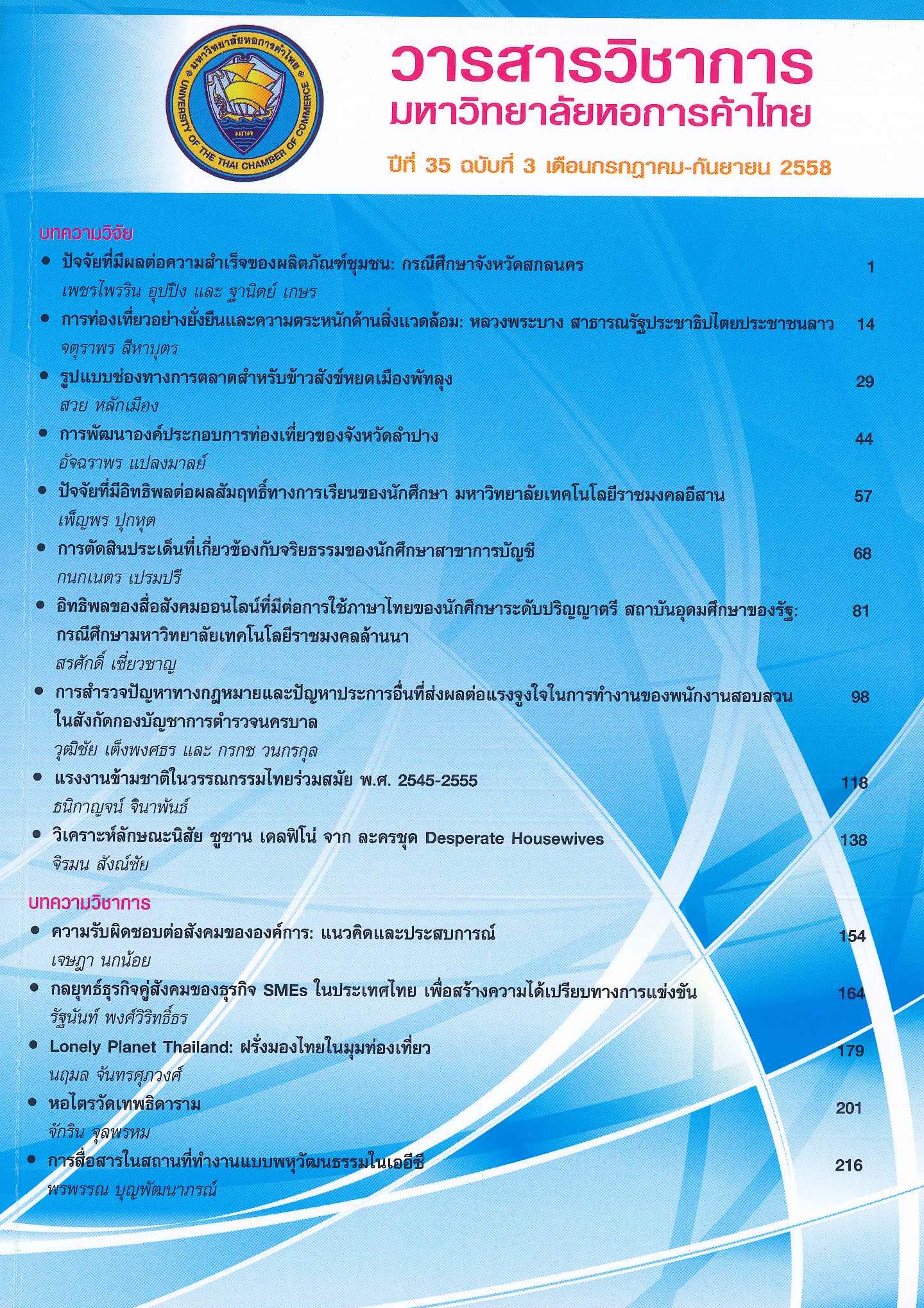Knowledge of Sustainable Tourism and Environmental Awareness: Luang Prabang, Laos PDR
Main Article Content
Abstract
Sustainable tourism takes full account of current and future economic, social and environmental impacts. Luang Prabang’s tourism progress is rooted in its natural and man-made beauty. This abundance has a positive economic impact on local businesses providing support services to the increasing number of visitors. On the other hand, the uncontrolled development from tourism activity threatens the unique atmosphere of Luang Prabang. The purpose of this study is to provide environmental tourism knowledge for tourism entrepreneurs by creating an environmental tourism booklet. Moreover, the research aims to investigate the tourism stakeholder participation in sustainable tourism and environmental tourism impacts in Luang Prabang. A semi-structured interview method was used to collect information from 44 tourism stakeholders comprising tourist entrepreneurs and local authorities, tourism boards, local communities and tourists. The research found that small establishments could implement the simple aspects of environmental awareness. Most entrepreneurs were concerned about environmental awareness because Luang Prabang is a World Heritage City under the management of UNESCO. The results also showed that some luxury hotels created a Corporate Social Responsibility Program (CSR) to enhance a sustainable environmental goal. However, the main problems relating to the environment were separating waste and reducing plastics. There was a lack of environmental campaigns from the governmental sector. The booklet distribution was useful and will raise environmental awareness among tourism entrepreneurs. The governmental sector was a significant policy-maker that can contribute to the environmental protection cycle of green enterprises by means of providing facilities, funds, knowledge transfer, and human resource management
Article Details

This work is licensed under a Creative Commons Attribution-NonCommercial-NoDerivatives 4.0 International License.
ลิขสิทธิ์ของบทความ
ผลงานที่ได้รับการตีพิมพ์ถือเป็นลิขสิทธิ์ของมหาวิทยาลัยหอการค้าไทย ห้ามมิให้นำเนื้อหา ทัศนะ หรือข้อคิดเห็นใด ๆ ของผลงานไปทำซ้ำ ดัดแปลง หรือเผยแพร่ ไม่ว่าทั้งหมดหรือบางส่วนโดยไม่ได้รับอนุญาตเป็นลายลักษณ์อักษรจากมหาวิทยาลัยหอการค้าไทยก่อน
References
Charoenkijjarukorn, P. 2013. “Green Productivity and Sustainablity Reporting Guidelines.” University of Thai Chamber of Commerce Journal 33, 1: 214-184. (in Thai).
Clayton, T., and Criscuolo, C. 2002. “Electronic Commerce and Business Change.” National Statistics [Online serial]. Available: https://www.statistics.gov.uk/cci/article.
Cooper, C., Scott, N., and Baggio, R. 2009. “Network Position and Perceptions of Destination Stakeholder Importance.” An International Journal of Tourism and Hospitality Research 20, 1: 33-45.
Daniel, E.S., Nadeson, T., and Shafiee, M. 2007. Organising for Action in Environmental Education through Smarts Partnerships: A Malaysian Experience. Proceeding of the International Conference for the Environment, April 2006. Zimbawe: UNSPECIFIED.
Fakeye, P.C., and Crompton, J.L. 1991. “Image Differences Between Perspective, First Time, and Repeat Visitors to the Lower Rio Grand Valley.” Journal of Travel Research: 30,2 10-16. Cited in Sirichote, O. 2014. "Destination Image of Songkhla Province." University of Thai Chamber of Commerce Journal 34, 3: 56-57.(in Thai).
Hamalainen, Emilia. Young Adults’ Environmental Knowledge, Attitudes And Travelling Behaviour. Degree Project Paper. Vaasa, Finland: Vaasa University of Applied Science. Cited in Murugadas R. and Badaruddin M. 2014.”Impacts of Tourism on Environmental Attributes, Environmental Literacy and Willingness to Pay: A Conceptuel and Theoretical Review.” Procedia-Social and Behavioral Science Vol.144: 378-391.
Kirk, D., and Pind, R. 1998. “Research in Hospitality Systems and Technology.” International Journal of Hospitality Management 17, 2: 203-217.
Krippendort, J. 1987. The Holiday Makers. Butterworth Heinemann: Oxford. Cited in Harng Luh Sin and Claudio Minca. 2014. “Touring Responsibility: The Trouble with ‘Going Local’ in Community-Based Tourism in Thailand.” Geoforum Vol. 51: 96-106.
Laos. Ministry of Agriculture and Forestry, 2005. Forest Strategy to the Year 2020 (FS 2020) of the Lao PDR. Laos: Ministry of Agriculture and Forestry.
Laos. Tourism Development Department. 2013. Statistics Report on Tourism in Laos [Online] Available: https://www.tourismlaos.org/show.php?Cont_ID=43.
Making Tourism More Sustainable – A Guide for Policy Makers. 2005. Paris: United Nations Environment Programme; Madrid: World Tourism Organization.
Ponanake, P. 2012. “Communicating 7 Greens Concept for Sustainable Tourism of Bangkla Chachoengsao Province’s Floating Market.” University of Thai Chamber of Commerce Journal 32, 3: 156-170. (in Thai).
Roth, E. 1992. Environmental Literacy,Its Roots Evolution and Direction in the 1990s. Columbus, OH: Educational Resources Information Center.
Sihabutr, C. 2012. “Technology and International Specialisation in Tourism.” Doctoral dissertation, Universite de Toulouse Le Mirail, France.
Swarbrooke, J. 1999. Sustainable Tourism Management. Wallingford, UK: Cabi.
Sofield, Trevor, H.B. 2003. Empowerment for Sustainable Tourism Development. Oxford: Elsevier Science.
United Nations. 1992. Report of The United Nations Conference on Environment and Development, Rio de Janeiro from 3 to 14 June 1992. Rio de Janeiro: United Nations.
Varisli, T. 2009. “Evaluating Eight Grade Students’ Environmental Literacy: The Role of Socio-Demographic Variables.” Master’s Thesis, Graduate School of Social Science, Middle East Technical University.
Vellas, F. 2007. Role of I.T.C. in the Implementation of Effective Tourism Policies and Strategies for Developing Countries: Best Practice, New Products, New Market, and Competitiveness, Meeting on the Trade and Development Implications of Tourism Services for Developing. Geneva: UNCTAD.
Weaver, D.B. 1991. ''Alternative to Mass Tourism in Dominica.'' Annals of Tourism Research Vol. 18: 414-432. Cited in Harng Luh Sin and Claudio Minca. 2014. ''Touring Responsibility: The Ttrouble with 'Going Local' in Community-Based Tourism in Thailand.'' Geoforum Vol. 51: 96-106.
Weaver, D.B. 1995. “Alternative Tourism in Montserrat.” Tourism Management Vol. 16, 593-604. Cited in Harng Luh Sin and Claudio Minca. 2014. “Touring Responsibility: The Trouble with ‘Going Local’ in Community-Based Tourism in Thailand.” Geoforum Vol. 51: 96-106.
World Tourism Organization (UNWTO). 1999. Marketing Tourism Destinations Online: Strategies for the Information Age. Madrid: WTO.
Zhong , L., et al. 2011. “Research on Environmental Impacts of Tourism in China: Progress and prospect.” Australia: Journal of Environmental Management 92, 11: 2972-2983.


